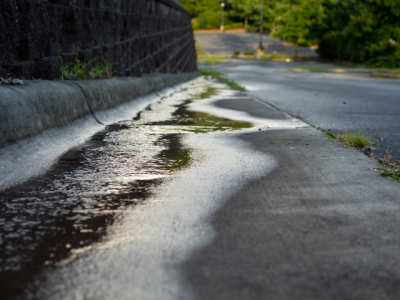
The Vermont Agency of Transportation is accepting grant applications for three grant programs:
- the Better Roads Grant Program (Better Roads),
- the Transportation Alternatives Program (TAP), and
- the Municipal Highway and Stormwater Mitigation Program (MHSMP).
What do these programs fund?
Better Roads funds smaller municipal road projects that improve water quality and result in maintenance cost savings.
TAP funds projects defined as transportation alternatives, including on- and off-road pedestrian and bicycle facilities, infrastructure projects for improving non-driver access to public transportation and enhancing mobility, community improvement activities, and environmental mitigation, trails that serve a transportation purpose, and safe routes to school projects. Salt and sand sheds that can demonstrate a link to water quality improvement are eligible for TAP funding. All projects must demonstrate a strong transportation link.
MHSMP funds larger environmental mitigation projects, including planning studies, salt and sand sheds where construction would have a water quality benefit, bank stabilization, culvert replacement/resizing, detention ponds and infiltration basins, check dams, swirl separators, permeable pavers, gravel wetlands, and other stormwater projects related to the transportation system.
What This Program Funds
Better Roads funds road erosion inventories reassessments (Category A) and smaller construction projects focused on erosion control and certain road maintenance techniques (Categories B, C, and D).
- Category A applications ask municipalities to apply for a set amount based on a predetermined VTrans schedule.
- Category B projects must correct a road related erosion problem and/or stormwater mitigation/retrofit for gravel and paved roads. The maximum grant amount is $20,000.
- Category C projects must correct a streambank, lakeshore, or slope related program. The maximum grant amount is $40,000.
- Category D projects are structure and culvert installations or replacement for culverts of 36 inches or larger. Category D is intended to fund one single culvert or structure that is not under the Municipal Roads General Permit jurisdiction. The maximum grant amount is $60,000.
TAP funds both scoping/feasibility studies and construction projects. Approximately 50% of TAP funds are reserved for pollution mitigation projects relating to stormwater and highways, including eligible salt and sand shed projects. Scoping/feasibility studies typically are awarded $40,000 to $70,000 while construction projects can request up to $600,000. Salt and sand sheds can apply for up to $500,000.
MHSMP funds both scoping/feasibility studies and larger construction projects. There is not a program cap on the amount of funding an applicant can request for a project.
How Your Community Applies
A Letter of Intent (LOI) for Better Roads Category A projects (road erosion inventories) are a fillable form submitted via email. LOIs will be accepted on a first come, first served basis until 10/31/25 or until funds are exhausted.
Applications for Better Roads Category B, C, and D projects (construction) are a PDF form (non-fillable) submitted via email. Applications are due 10/31/25.
TAP and MHSMP use the same application to apply to both programs. VTrans decides which program is the best fit to your project. You can submit multiple applications. The fillable form is submitted via email. Applications are due by 11/07/25.
Make Your Community's Application Competitive
Better Roads:
- Projects must protect or enhance water quality. Lower cost, higher benefit projects are most competitive.
- Construction projects that are in full compliance with the Municipal Roads General Permit are most competitive.
- Supporting documentation from an Agency of Natural Resources (ANR) River Management Engineer, ANR Lakes and Ponds Section staff, ANR Watershed Basin Planner, VTrans District Technical staff, or Regional Planning Commission staff will increase competitiveness of an application.
For TAP and MHSMP,
- Projects must demonstrate a strong transportation link.
- Eligibility for salt sheds is considered on a case-by-case basis based on proximity of the existing storage location to a major water body (generally within 50 ft.).
- Projects that have a scoping/feasibility study completed are more competitive.
- If a project is not completed (study not finished, construction project doesn't advance past design), pay back of all federal funds is required. It can be helpful to budget for robust public engagement (more than the required meetings) for both scoping and construction projects.
- Project sponsors are required to have a qualified local project manager. This cost should be incorporated into the application budget.
- Be realistic about timing. Design and construction projects funded through these programs typically will take 3-4 years to complete.
Additionally:
TAP: Describing your trail or path as "recreation" will make it less competitive; the focus of this grant is transportation (traveling to and from destinations). Projects must be "functionally necessary". If you are requesting additional funding, your project must have a current NEPA clearance and Right of Way clearance to be eligible.
MHSMP: Projects must demonstration a clear water quality benefit. Projects that treat a higher portion of highway runoff are more competitive. Submit pictures and a map(s) to help describe and demonstrate the problem.
Where You Can Learn More
Better Roads:
- For project and program technical information questions, contact Dan Judkins at 802-595-6184 or email Betterroads@vermont.gov.
- For funding or general program questions, contact Ross Gouin at 802-595-2381 or ross.gouin@vermont.gov.
TAP: Contact Scott Robertson, Transportation Alternatives Program Manager, at 802-793-2395 or scott.robertson@vermont.gov.
MHSMP: Contact Ross Gouin, Municipal Highway Stormwater Mitigation Program Manager, at 802-595-2381 or ross.gouin@vermont.gov.
Find Grant Writing or Grant/Project Management Help
VLCT published a resource, Increasing Municipal Capacity for Grants, that offers ideas for assistance with grants. Many of the capacity builders also provide project management services. Hiring experienced project management assistance can increase the speed of project development and help avoid cost, permitting, and other development surprises.